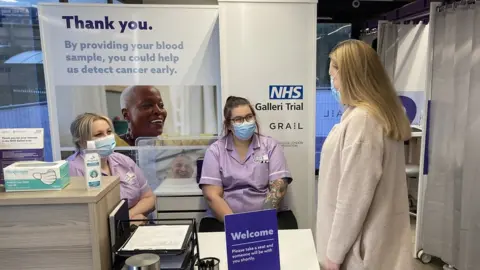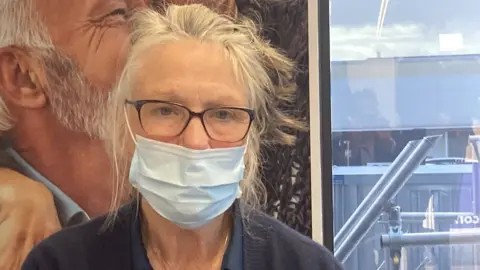Cancer blood test: Thousands take part in NHS trial
 BBC
BBCThousands of volunteers are being invited to give blood samples as part of a trial for a test that detects cancer before symptoms appear.
The Galleri test is designed to check for the earliest signs of more than 50 types of cancer.
The NHS trial aims to recruit 140,000 volunteers, who will give blood samples at mobile clinics around the country.
Participants have already been giving samples at a supermarket car park in Derby, one of the first locations.
Teresa Oates, 72, felt it was important to take part because her mother died from pancreatic and stomach cancer.
"Once she started getting symptoms it was far too late to do anything about it," Ms Oates, from Morley in Derbyshire, said.
"But I also have somebody very close in my family who by pure luck went for an X-ray and they picked up his cancer.
"I believe it has saved his life and he has lived 20 years since then."

The test works by finding chemical changes in fragments of genetic code - cell-free DNA (cfDNA) - that leak from tumours into the bloodstream.
The trial is invitation-only, and the NHS is sending thousands of letters to people aged between 50 and 77.
After giving an initial sample, they will be invited back after 12 months, and again at two years, to give further blood samples.
Initial results of the study are expected by 2023. If successful, NHS England plans to extend the tests to a further one million people in 2024 and 2025.
'Just an illness that's treatable'
GP Jenny Pickard, who is cancer lead for Derby and Derbyshire clinical commissioning group, hopes the test will be "a game-changer for early cancer diagnosis in the future".
"If this blood test proves to be successful, my personal hope is that cancer could just be an illness that's treatable, if we're able to detect at such early stages," she said.
"[At the moment] we have to rely on patients presenting to us with symptoms.
"That means that by the time they are diagnosed, they are often at a stage where the treatment options are limited or there aren't any treatment options."
The clinic will stay in Derby for a month before moving on to Northampton, Nottingham, Leicester, and Lincoln.

Follow BBC East Midlands on Facebook, Twitter, or Instagram. Send your story ideas to [email protected].
